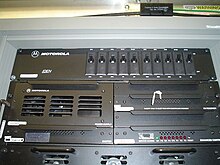IDEN
- For other uses of Iden/IDEN see Iden (disambiguation)
Integrated Digital Enhanced Network (iDEN) is a mobile telecommunications technology, developed by Motorola, which provides its users the benefits of a trunked radio and a cellular telephone. iDEN places more users in a given spectral space, compared to analog cellular and two-way radio systems, by using speech compression and time division multiple access (TDMA).
Operating frequencies
iDEN is designed and licensed to operate on individual frequencies that may not be contiguous. iDEN operates on 25 kHz channels, but only occupies 20 kHz in order to provide interference protection via guard bands. By comparison, TDMA Cellular (Digital AMPS) is licensed in blocks of 30 kHz channels, but each emission occupies 40 kHz, and is capable of serving the same number of subscribers per channel as iDEN. iDEN uses frequency-division duplexing to separate transmit and receive signals, with transmit and receive bands separated by 39MHz, 45MHz, or 48MHz depending on the frequency band being used [1].
iDEN supports either three or six interconnect users (phone users) per channel, and six dispatch users (push-to-talk users) per channel, using time division multiple access. The transmit and receive time slots assigned to each user are deliberately offset in time so that a single user never needs to transmit and receive at the same time. This eliminates the need for a duplexer at the mobile, since time-division duplexing of RF section usage can be performed.
Hardware
The first ever iDEN handset was Motorola's L3000, which was released in 1994. Most modern iDEN handsets use SIM cards, just like GSM and compatible with GSM handsets. Early iDEN models such as the i1000plus stored all subscriber information inside the handset itself, requiring the data to be downloaded and transferred should the subscriber want to switch handsets. Newer handsets using SIM technology make upgrading or changing handsets as easy as swapping the SIM card. Four different sized SIM cards exist, "Endeavor" SIMs are used only with the i2000 without data, "Condor" SIMs are used with the two-digit models (i95cl, for example) using a SIM with less memory than the three-digit models (i730, i860), "Falcon" SIMS are used in the three-digit phones, (i530, i710) and will read the smaller SIM for backward compatibility, but some advanced features such as extra contact information is not supported by the older SIM cards. There is also the "Falcon 128" SIM, which is the same as the original "Falcon", but doubled in memory size, which is used on new 3 digit phones (i560, i930).

The interconnect-side of the iDEN network uses GSM signalling for call set-up and mobility management, with the Abis protocol stack modified to support iDEN's additional features. Motorola has named this modified stack 'Mobis'.
[Base Site Timing Reference] Each Base site requires precise timing and location information to synchronize data across the network. To obtain and maintain this information each EBTS uses GPS satellites obtain a precise, timing reference pulse. [Discussion[:szcy2008@hotmail.com]]
Operators
In the United States of America there are two large public iDEN service providers: Sprint Nextel and SouthernLINC Wireless, and several small public and private iDEN service providers. Numerous private systems exist, including one run by ARINC, covering all major airports. Countries which have operating iDEN networks include Canada, Argentina, Peru, Mexico, Brazil, Jordan, Chile, Israel, Philippines, Singapore, Saudi Arabia, Japan, El Salvador, China and most recently India and Guatemala. Full Roaming is available between Sprint/Nextel in the US, Telus (Canada), and NII (Mexico and S. American markets) Data/Voice/Radio. For markets not controlled by NII Holdings, Inc., the roaming is for voice telephony only.
Motorola is committed to support of iDEN technology despite the Sprint buyout of Nextel and Sprint/Nextel's supposed eventual conversion to Sprint's CDMA system. Nextel has stated they will support iDEN until at least 2010, while other iDEN carriers have no foreseeable expiration date for their services. The speed of iDEN's Push-To-Talk (a.k.a Dispatch) feature is unparalleled, and remains the fastest in the industry.
There is a smaller subset of the iDEN network called "Harmony Wireless Communications System", With Small System Release 5.0, it supports a maximum limit of 192 sites. With the introduction of Small System Release 6.1, it gains the ability to interface with a full iDEN system. SSR7.0 is the latest Harmony Small System Release.
Countries operating iDEN networks
| Company Name | Country | Push To Talk Name |
|---|---|---|
| Airtel Wireless Ltd. | Fleet Connect | |
| Airpeak | Talk Direct | |
| Airtel | cellular radio | |
| ARINC | ||
| Avantel | ||
| Boost Mobile | Chirp | |
| Bravo Telecom | Push To Talk | |
| Procall Pvt. Ltd. | Digital Push To Talk | |
| China Satcom Guomai Comm Co. L | ||
| Connect Net | ||
| GRID Communications | Push To Talk | |
| Iconnect | iConnect PTT | |
| Intelfon | RED | |
| Intelfon | RED | |
| Mirs | ||
| Monttcashire | ||
| NEXNET | ||
| Sprint | Direct Connect | |
| Nextel Argentina | Direct Connect | |
| Nextel Brazil | Direct Connect | |
| Nextel Chile | Direct Connect | |
| Nextel Mexico | Direct Connect | |
| Nextel Peru | Direct Connect | |
| Next Mobile | Walkie-Talkie | |
| Proxtel Wireless | ||
| Shenzhen Yunliantong Comm Service | ||
| KT Powertel | ||
| SouthernLINC Wireless | InstantLINC | |
| Telus | Mike | |
| XPress | XPress Direct Connect |
